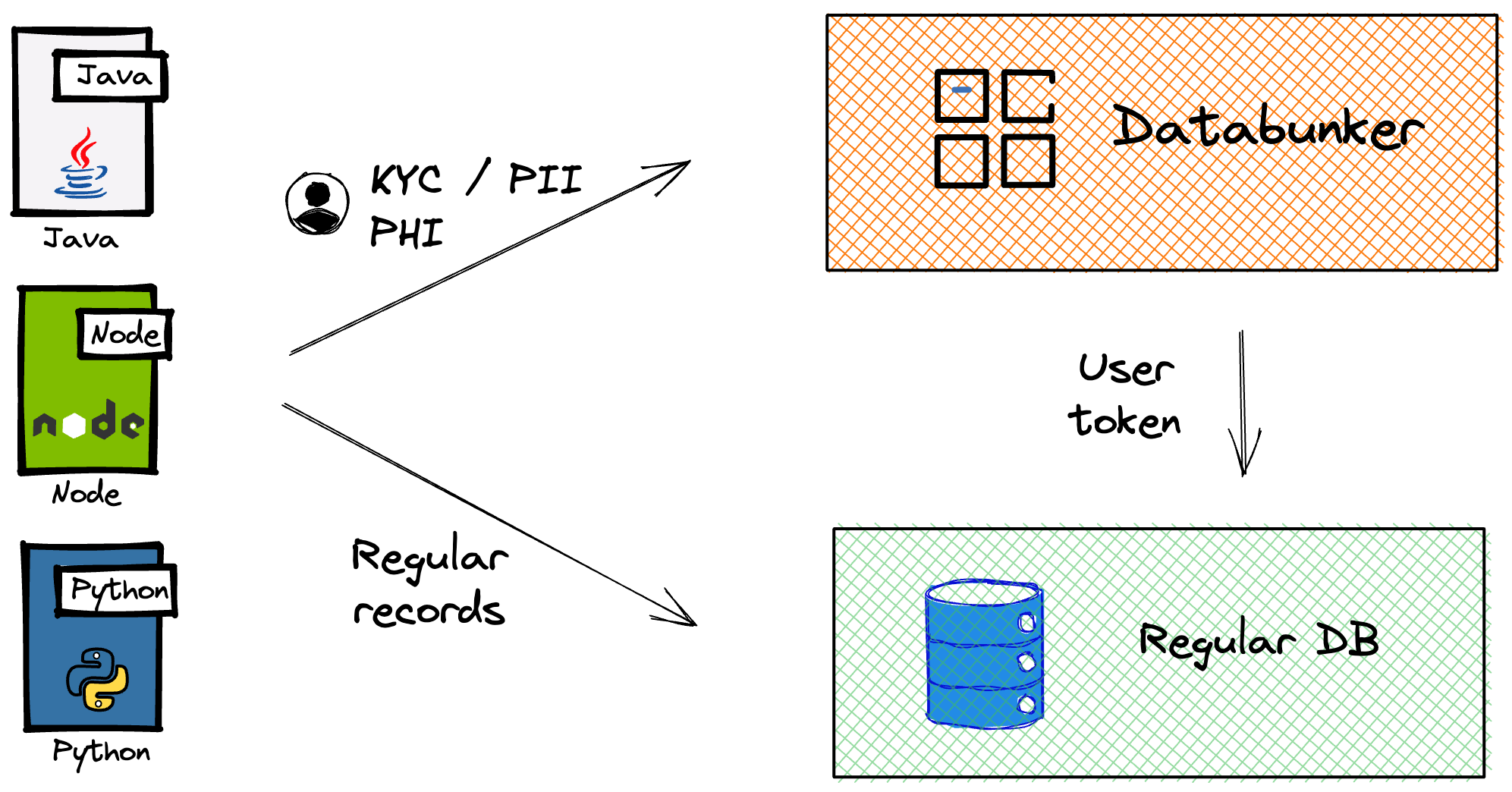The Best Way to Secure Your Customers' Data
User profile and credit card tokenization service - simplify compliance for PII/PHI/PCI/KYC records
- Go-powered, lightning-speed tokenization engine
- Built-in SQL/GraphQL injection protection
- API integration in under 10 minutes
🎉 5 years since the project's creation! This project started open-source and now serves tens of customers with its professional version.
Accelerate GDPR Compliance Using Databunker Pro
In today’s data-driven world, compliance with the European Union’s General Data Protection Regulation (GDPR) is critical for organizations handling personal data. Non-compliance can lead to fines of up to €20 million or 4% of annual global turnover, with over €2.7 billion in penalties already issued. Databunker Pro, a secure vault for sensitive data, simplifies GDPR compliance by providing robust tools to protect personally identifiable information (PII), streamline user rights management, and ensure data security.
Why GDPR Compliance Matters
GDPR sets stringent standards for processing personal data, empowering individuals with control over their information while requiring organizations to implement strong security and privacy measures. Whether you’re a startup serving European customers or a global enterprise, GDPR compliance is non-negotiable. Databunker Pro’s privacy-by-design approach helps you meet these requirements efficiently, reducing the risk of fines and building trust with your users.
How Databunker Pro Supports GDPR Compliance
Databunker Pro is a lightning-fast, Go-based service designed to securely store sensitive records, such as PII, PHI, KYC data, and credit card information. Its comprehensive features align with GDPR’s core principles, making compliance straightforward and cost-effective.

Secure Data Storage and Encryption
GDPR mandates robust security to protect personal data from unauthorized access or breaches. Databunker Pro acts as an encrypted vault, using AES-256 encryption for data at rest and in transit. Unlike traditional database encryption, Databunker’s API-based access prevents SQL or GraphQL injection attacks, ensuring data confidentiality and integrity.
Data Minimization and Deletion
Under GDPR’s data minimization principle, organizations must collect only what is necessary and delete data when no longer needed. Databunker Pro’s automatic data minimization API enables proactive removal of expired records, such as those of trial users or inactive customers. The “forget-me” operation supports GDPR’s right to erasure, allowing users to request permanent data deletion with ease.
User Request Automation
GDPR grants individuals specific rights over their data, and Databunker Pro automates the execution of these requests to reduce manual workloads. Through its User Privacy Portal, organizations can efficiently handle user requests while ensuring compliance. Databunker Pro supports the following GDPR user rights:
- Right to Access: Users can view their stored data via a secure, passwordless portal.
- Right to Erasure: The “forget-me” feature enables permanent data deletion upon request.
- Right to Rectification: Users can update inaccurate or incomplete data through the portal.
- Data Portability: Users can receive their data in a structured, machine-readable format.
- Restriction of Processing: Organizations can limit data processing as requested by users.
- Objection to Processing: Databunker facilitates user objections to specific data uses, such as marketing.
User Privacy and Control
GDPR emphasizes transparency and user empowerment. Databunker Pro’s User Privacy Portal enables customers to access their data, manage consents, and request changes using one-time codes sent via email or SMS. This self-service approach enhances user trust and simplifies compliance with GDPR’s data subject rights.
Audit Logging and Accountability
GDPR requires organizations to demonstrate accountability through detailed records of data processing activities. Databunker Pro generates comprehensive audit logs for all operations, tracking access, modifications, and deletions. These logs support compliance reporting and facilitate investigations, ensuring transparency and adherence to GDPR’s accountability principle.
Consent Management and Privacy by Design
Databunker Pro embeds privacy by design into its architecture, ensuring data protection from the ground up. Its consent management features allow organizations to store and manage user consent securely, supporting lawful data processing. By tokenizing entire user objects and restricting bulk data retrieval, Databunker minimizes privacy risks and aligns with GDPR’s privacy-focused requirements.
DPO Management Capabilities
Data Protection Officers (DPOs) play a critical role in GDPR compliance, and Databunker Pro equips them with powerful tools to oversee data protection strategies. Key features include:
- Comprehensive Audit Trails: Detailed logs of all data operations enable DPOs to monitor compliance and respond to regulatory inquiries.
- User Request Management: The User Privacy Portal streamlines the handling of data subject requests, reducing administrative burdens.
- Compliance Reporting: Databunker Pro’s reporting capabilities help DPOs generate evidence of GDPR adherence, such as consent records and data processing activities.
- Risk Mitigation: Tokenization and encryption minimize the risk of data breaches, supporting DPOs in maintaining a secure data environment.
These features empower DPOs to focus on strategic oversight while Databunker Pro handles operational compliance tasks.
Databunker Pro for Developers
Databunker Pro is built with developers in mind, offering a robust API and flexible features to integrate secure data management into any application. Key developer-focused capabilities include:
- API-Driven Integration: A RESTful API enables seamless integration with existing systems, allowing developers to store and retrieve sensitive data securely.
- Granular Access Control: Role-based access ensures that only authorized users or applications can interact with specific data, enhancing security.
- PII, PHI, and KYC Storage: Securely store sensitive data types, such as personally identifiable information (PII), protected health information (PHI), and know-your-customer (KYC) records, with built-in compliance.
- Credit Card Tokenization: Safely tokenize payment data to comply with PCI DSS and GDPR, reducing the risk of storing raw card details.
- Secure Bulk Requests: Process bulk data operations with strict access controls and encryption, ensuring scalability without compromising security.
Developers can deploy Databunker Pro in minutes using Docker Compose or Helm charts, making it an ideal choice for startups and enterprises alike.
Benefits of Using Databunker Pro
- Simplified Compliance: Streamline GDPR, HIPAA, ISO 27001, and SOC2 compliance with built-in tools for data protection and reporting.
- Cost-Effective: Try Databunker Pro’s enterprise features with a free 14-day trial—no credit card required.
- Flexible Deployment: Deploy on-premises or in the cloud, tailored to your infrastructure.
- Developer-Friendly: APIs and access controls make integration fast and secure.

👋 Want to learn about Databunker?
Take a closer look at how Databunker securely stores and manages sensitive data at scale.

